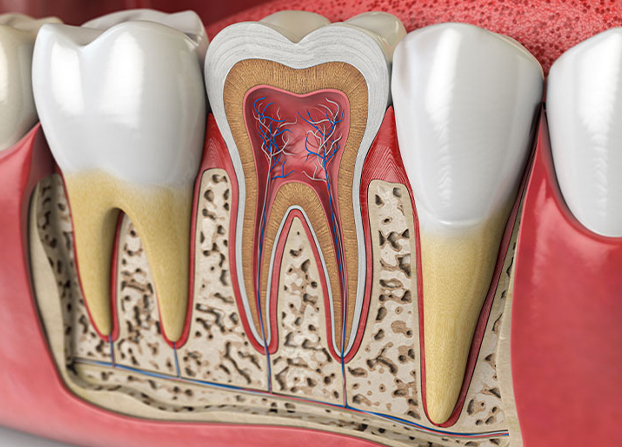Root Scaling and Planing

Effective Gum Disease Treatment
If you have gum disease, root scaling and planing can help restore your oral health. This treatment is essential for healthy gums and teeth, as it effectively combats the effects of gum disease.
At Cedar Grove Dental Group, we offer root scaling and planing treatments in Cedar Grove and the surrounding area. Our team is dedicated to improving your oral health. Contact us at (973) 857-0567 to find out more about our services or to book an appointment.
A Summary of Root Scaling and Planing
Root scaling is a periodontal treatment that deep cleans the gums, going beyond the routine cleaning during a regular dental check-up. During the procedure, we will remove all plaque, bacterial toxins, and tartar deposits from the teeth and root surfaces. A dental scaler or ultrasonic instrument can assist in clearing the bacterial buildup.
For even deeper cleaning, patients can undergo a root planing treatment. During root planing, we will clean under the gum line to remove plaque and tartar. The root surface of the gums is smoothed and treated to prevent the progression of gum disease. These non-surgical procedures aim to remove bacteria from the gum and root for patients with deep periodontal pockets.
“ The goal of these non-surgical procedures is to eliminate bacteria from the gum and root in patients with deep periodontal pockets.”
When should you schedule your root scaling and planing procedure?
We recommend root scaling and root planing to combat chronic periodontal disease, also known as gum disease. Patients with receding gums can also benefit from this treatment. During a routine dental examination, we will assess the patient’s gum line and periodontal pockets. Deep pockets may indicate signs of periodontal disease and necessitate root scaling or planing.
Without root scaling or root planing treatment, people with periodontal disease can suffer additional oral and overall health problems. Eventually, the bacteria from diseased gums can lead to receding gums, tooth loss, bone loss, or loose teeth. Root scaling and planing can help repair some of the damage and prevent further gum damage. Additional treatments may be necessary in cases where the periodontal pockets have become deeper.
"Failure to undergo root scaling or root planing treatment for periodontal disease can lead to additional oral and overall health issues."
A Breakdown of the Procedure
Depending on the severity of the situation, root scaling and planing treatments may be broken up into multiple appointments. These procedures are done on an outpatient basis, and patients may or may not need a local anesthetic to numb the treatment site. We may focus on certain parts of the mouth during each appointment instead of treating the entire area in one visit.
Root scaling occurs before root planing. During root scaling, we will scrape plaque deposits from the teeth and the large pockets between the gums. During root planing, we will go deeper into the gum line to remove bacteria and plaque. We will smooth out the roots deep within the gum line, clearing off tartar buildup and bacteria. At the end of the procedure, the gums and mouth are flushed with water to remove any remaining loose residue or bacteria.
"Depending on the seriousness of the situation, root scaling and planing treatments may need to be scheduled over several appointments."
Benefits and Drawbacks of Root Scaling Treatment
One of the biggest benefits of root scaling and root planing is that it helps prevent further gum disease. After treatment, patients will have cleaner mouths with fewer gum problems and cavities. Healthier gums feel less tender and will not bleed while flossing or brushing.
However, root scaling and planing may not be the best treatment option for everyone. Patients who do not commit to excellent oral hygiene habits may not see as many benefits in the future. Additionally, immunocompromised individuals or patients with severely receding gums may not be candidates for the treatment.
"Root scaling and root planing have a major advantage in that they can help stop gum disease from progressing."
Treatment Aftercare
It is common to experience gum sensitivity in the days following a deep cleaning treatment. This may include tenderness, swelling, and even bleeding. We advise patients to brush their teeth gently, use wax-coated floss, and rinse their mouth with warm salt water or an oral rinse to prevent infection.
A follow-up appointment is required to assess gum improvement. If the gums are firm and pink, and the pockets are smaller, further treatment may not be necessary. Patients can then schedule regular dental check-ups to maintain gum and oral health.




